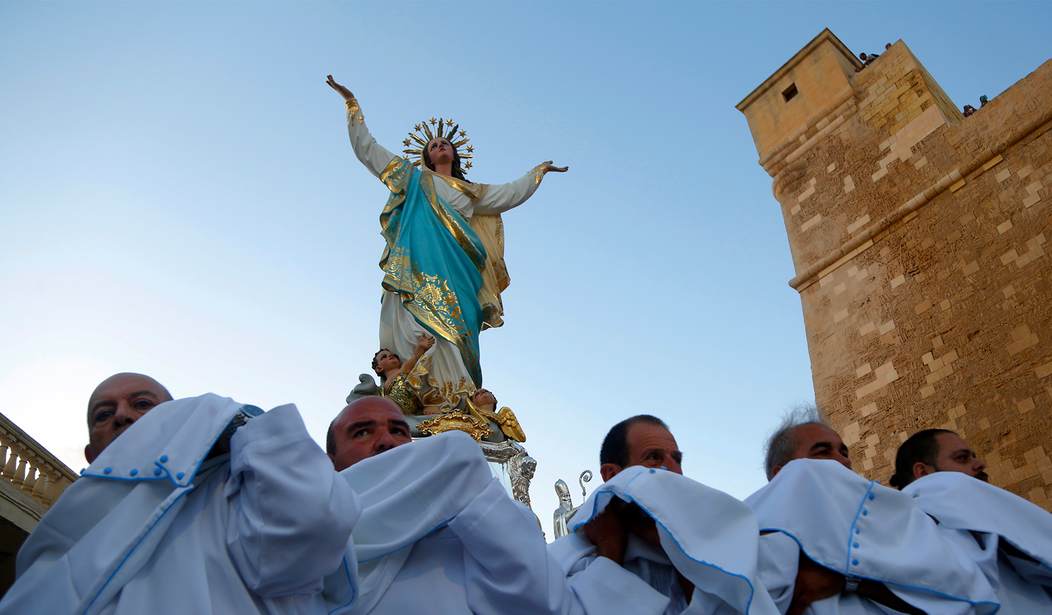I spent the first 20 years of my Christian walk as a Reformed Baptist before making a big splash in the Tiber River — figuratively, not literally — and converting to Catholicism. I spent almost a decade wrestling with the theological claims of Rome, spending hundreds of hours reading books on both sides of the issues, watching thousands of hours of videos and listening to who knows how many podcasts. It was a long, painful, torturous process, but in the end, coming home to Rome was the best choice of my life.
One of the first big dominoes to fall for me was the Blessed Mother, the Virgin Mary. The very flowery, poetic language that Catholics use to lavish Mary with praise made me extremely uncomfortable at first, especially when it came to Marian titles. As a Protestant, many “anti-Catholics” beat it into my head that there is only one mediator between man and God: Jesus Christ.
And that's absolutely correct. There is only one mediator that can unite mankind to God and that's Jesus, who made this possible through his life, death, and resurrection. No one else was, is, or could be qualified to atone for the sins of humanity. Thus, to my Protestant ears, hearing Mary referred to as a "co-redemptrix" was tantamount to blasphemy.
However, during my long walk toward the Catholic Church, I started to dig into what that phrase actually meant rather than going by what other, well meaning Protestants kept telling me it meant. What it really means is that Mary had a unique, subordinate role in the redemption of humanity through her faith, obedience, and cooperation with God, especially during her suffering at the foot of the cross. In other words, she stood with the Redeemer and, by saying yes to God to birth and raise the Redeemer, played a part in humanity's redemption, though that role was not equal to that of Christ.
It's a title that emphasizes the part the Blessed Mother plays in bringing people to Jesus, not that she did something directly to redeem mankind. Still, when you use the term "co-redemptrix" while trying to share the Catholic faith with anyone from the Protestant world, the term breeds confusion, either during discussions of Mary or when someone looks into the faith for themselves.
The Vatican’s Dicastery for the Doctrine of the Faith (DDF) issued a doctrinal note this week, Mater Populi Fidelis (“Mother of the Faithful People of God”), that rejects both of those titles for the Blessed Mother. Cardinal Victor Manuel Fernandez signed the document, and Pope Leo XIV approved it.
When the Vatican released the document publicly, it stirred up quite a bit of controversy, especially among more old school traditional Catholics who often seem to be dead set against any sort of clarification of doctrine they feel endangers the teaching of the Catholic Church. Keep in mind, these titles are not dogma, meaning one doesn't have to ascribe to them in order to be part of the Church.
Many, myself included, feel this clarification actually helps move the Church one step closer to unifying a highly fractured Christianity and removes unnecessary stumbling blocks for those Christians outside of communion with Rome. And that, especially in an era like ours that is hostile to the faith, is critical for saving Western civilization.
“When an expression requires many, repeated explanations to prevent it from straying from a correct meaning,” the note went on to say, “it does not serve the faith of the People of God and becomes unhelpful.”
The document then says that the title of "Co-Redemptrix" risks "eclipsing the exclusive role of Jesus Christ" and "would not be a true honor to his Mother." It also discourages Catholics from using the title "Mediatrix of All Graces," which it says lacks solid theological grounding from Sacred Scripture and contains "limits that do not favor a correct understanding of Mary's unique place."
Rather than use confusing titles that could potentially cause theological confusion for Catholics or those looking into the Church, Catholics should use titles cemented in Mary's motherhood such as "Mother of God" and "Mother of the Faithful People of God."
According to LifeSiteNews, "While the titles in question have deep roots in Catholic devotion and theology, the note signals a clear departure from this trajectory, placing renewed emphasis on Mary’s receptivity rather than her active participation in Christ’s work of redemption or the sanctification of Christians."
I don't think this is a bad thing in the slightest. The note isn't changing doctrine. It's clarifying it. Many within the Church fear modernism, and they absolutely should in many regards. Modernism often leads to heresies, like the acceptance and celebration of the LGBTQ agenda in some parishes by liberal priests and bishops.
This, however, is not on par with theological compromise. It's removing unnecessary stumbling blocks from the path of potential converts and opening the door a little wider for unity with Protestants. As long as the Church doesn’t alter official dogma, the faithful deposit the Apostles handed down to us remains intact, and there’s nothing here to fear.
Again, in a world where Christians are experiencing cultural persecution — along with more, for lack of a better term, "traditional" forms of persecution — those who worship the Lord Jesus Christ need to find common ground, to come together, love one another, and fight alongside each other for the Kingdom of God and the survival of Western culture.









